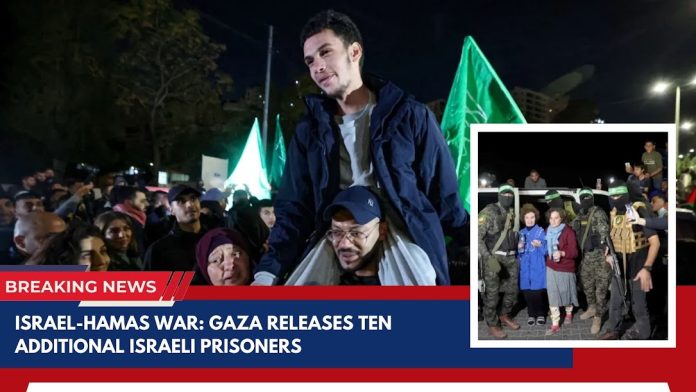- In the sixth swap, since the ceasefire began, twelve Israeli prisoners and four Thai nationals were let free in Gaza; thirty Palestinian women and children were also freed from Israeli detention facilities.
- According to analysts, the ceasefire talks have moved into a “pragmatic” stage including a number of mediators and parties, with Hamas indicating that it is eager to prolong the ceasefire.
- The foreign minister of Palestine demands a long-term ceasefire in the Gaza Strip, emphasizing that “massacres cannot resume.”
- Since October 7, almost 15,000 Palestinians have been killed in Gaza. The official death toll in Israel is 1,200.
Scared, hurt, but now free. Boy from Palestine remembers mistreatment in Israeli jail
Tuesday saw the 18-year-old Mohammad Salhab Tamimi released to his family as part of an ongoing prisoner exchange agreement.

As part of an ongoing prisoner swap agreement, 18-year-old Mohammad Salhab Tamimi was finally allowed to return to his family after spending eight months in Israeli prisons without facing any charges or being processed.
He embraced his parents with a serious look on his boyish face and stood looking a little confused as if he wasn’t sure whether to talk to the media or not.
During the eight months of unpredictability that had begun on October 7 and continued until now, when the Al-Aqsa Flood operation began, he had endured so much suffering.
The final words he heard from the oppressive Israeli jail officers were that if his loved ones celebrated his return, he would be arrested again and placed back into administrative custody.
“Tell your friends,” they advised. I’m going back to prison if we throw a big celebration,” he remembered.
With only their close family and a few uncles there, his family kept their happiness under wraps due to the Israeli military roadblock and illegal settlement near their house.
shook, scuffled, and degraded
Fortunately for the family, smiles don’t create noise, and no one could stop the grins on his mother Fatima and father Murshid’s faces as they clutched their “little boy” closely.

In the early hours of Tuesday night, their youngster was one of the four groups of Palestinian inmates to be released from the Ofer jail, which is located close to Ramallah. He had been uncertain about what was happening to him until the very last moment.
On Monday, November 27, at 7 a.m. (05:00 GMT), a guard at Rimon Prison made Mohammad prepare to be moved to Ofer Prison. That was all; there was no information regarding the cause of his movement. Only instructed to take off all of his clothes, put on a grey jail sweatsuit, and gather his possessions.
“I placed my garments into one of those plastic bags and proceeded to the cell door, where they restrained my hands and pushed my head below.”
“Then, the officer gave me a hard kick.” Because of the steel in his boots, it ached so much that I felt like he was crushing my feet.
He pulled me into the prison yard and proceeded to remove my clothes, throwing them into a rubbish pail while taking me out of the facility. Then he dragged me out while cursing at me in a vulgar manner, Mohammad recollected with a halt.
Mohammad was placed in a “bosta,” a van used for prisoner transfers that has its windows covered in black and have cramped, metal-seat cages to which inmates are shackled.
Bosta rides can last up to twelve hours. There aren’t any food, restroom, or rest areas. “I was detained in the car cell with nothing to eat or drink.
When Ofer was eventually released in the early hours of Tuesday, his father and uncle were waiting for him outside, so they could transport him home to Hebron, which is located to the south of the occupied West Bank.



